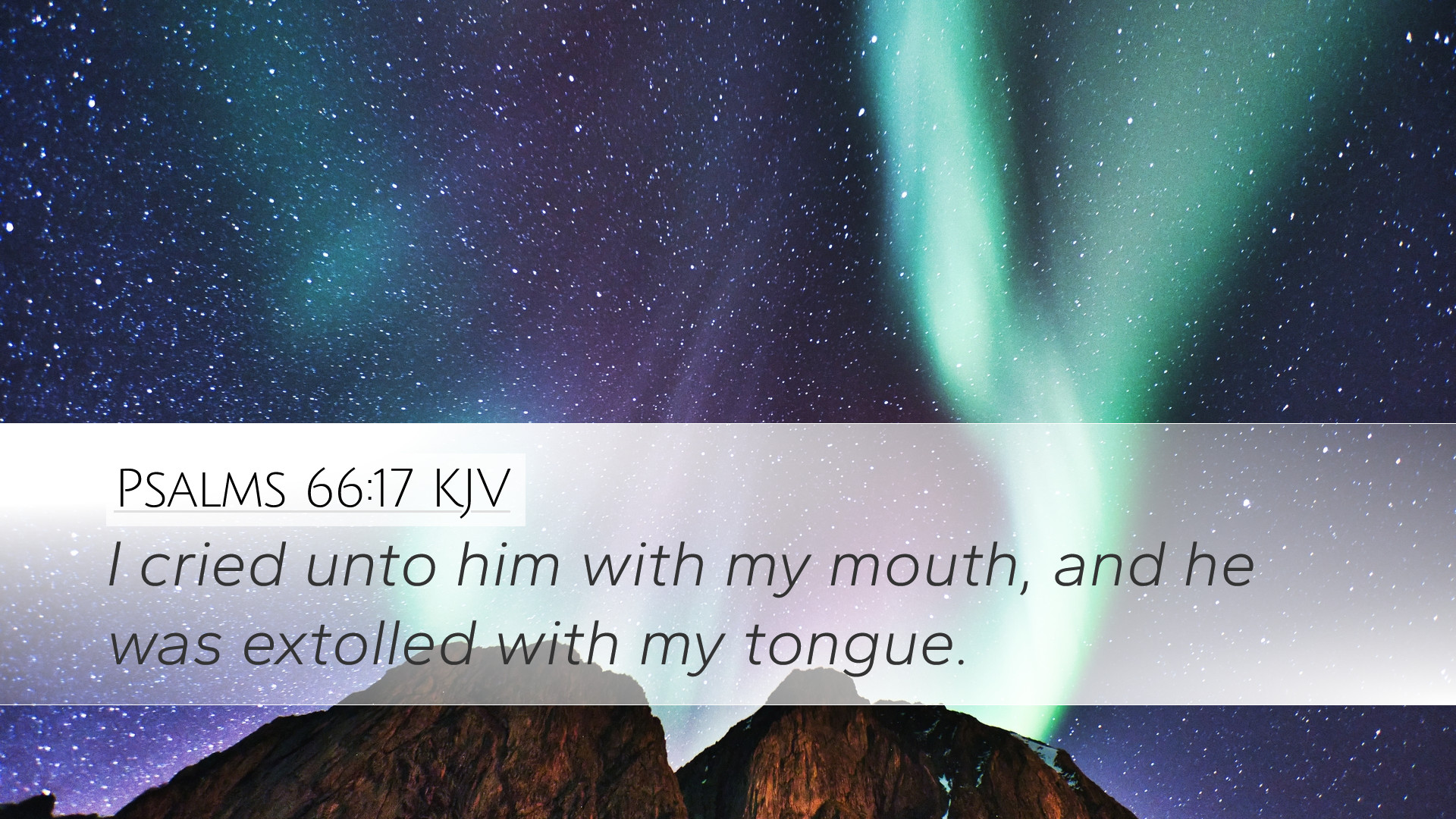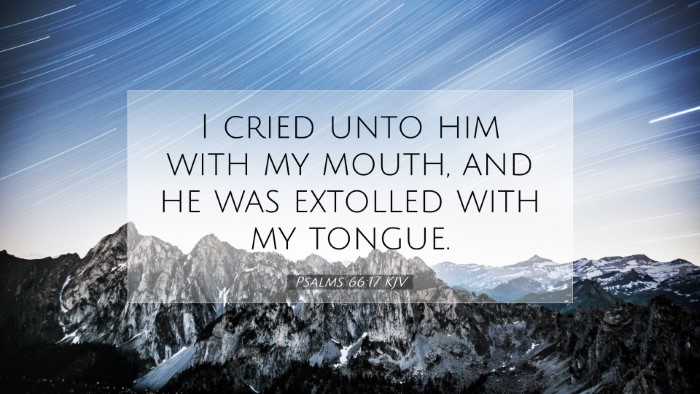Psalms 66:17 - Commentary
Verse: "I cried unto him with my mouth, and he was extolled with my tongue."
Introduction
This verse from Psalms encapsulates the heart of communication with God—both in earnest supplication and in exaltation. It demonstrates the dual aspects of prayer: impassioned appeal and commendation to God, a pattern that is essential for understanding true worship and the posture of one seeking divine intervention.
Matthew Henry's Insights
Matthew Henry brings a thoughtful perspective on the nature of prayer and praise. He emphasizes the necessity of crying out to God as an act of reliance and faith. Henry notes that the psalmist not only communicates his needs but also praises God upon receiving help. This dual approach—crying for mercy and extolling God—reflects a deep, meaningful relationship with the Creator.
- The Act of Crying: Henry suggests that 'crying' indicates urgency and sincerity. It is not a casual request but a desperate summons for help.
- Importance of Praise: The act of extolling God with the tongue highlights the believer's responsibility to acknowledge God's attributes and deeds. This serves both as an act of worship and as a testimony to others.
- Response to Divine Intervention: The psalmist’s experience of answered prayer is an impetus for extolling God, highlighting the importance of recognizing God's hand in our lives.
Albert Barnes's Commentary
Albert Barnes adds a rich layer to understanding this verse by exploring the dynamics of vocal prayer and the manifestation of praise. Barnes underscores that crying to God is a relational act—an invitation for God to engage with His people and respond to their needs.
- Vocal Crying: Barnes notes that the 'cry' represents all forms of petition including supplications and intercessions, showing God's ear is open to the pleas of His faithful.
- Extolling God: The phrase 'he was extolled with my tongue' showcases the outward expression of inward faith. This is not merely a personal experience but a communal witness to God’s greatness.
- God's Nature: Barnes emphasizes that extolling God with the tongue is grounded in an understanding of His attributes—His mercy, love, and sovereignty. It reflects the believer’s acknowledgment of who God is in light of their experiences.
Adam Clarke's Interpretation
Adam Clarke’s analysis offers a more detailed historical and contextual interpretation of the psalmist’s declaration. He highlights the significance of vocal prayers within the Jewish worship practices of the time.
- Historical Context: Clarke notes that the act of crying to God correlates with the established practices of ancient Israel, where vocal prayers, including loud cries for help, were customary in times of distress.
- Public Worship: The expression of extolling God was often communal, implying that the worship of God went beyond individual experience and encouraged a collective acknowledgment of God’s greatness.
- Encouragement for Believers: Clarke encourages believers to not shy away from vocalizing their needs and praises, illustrating that both aspects are vital to a healthy spiritual life.
Theological Reflections
From the insights garnered from the commentaries of Henry, Barnes, and Clarke, several theological reflections emerge:
- The Nature of Prayer: It is integral for believers to comprehend prayer as both a dialogue and a dual-response mechanism, where one’s cries for help are enveloped in a spirit of praise.
- Community and Individuality: The collective aspect of worship and prayer in the Psalms emphasizes the communal nature of faith wherein individual experiences contribute to the body of Christ’s worship.
- Acknowledgment of God’s Sovereignty: The act of extolling God invites believers to rest in His sovereignty and faithfulness, reminding the faithful of the importance of recognizing and reflecting on God’s past interventions.
Practical Applications
This verse carries practical implications for pastors, students of the word, and theologians alike:
- Encouragement in Prayer: It serves as a reminder that urgent, heartfelt prayer is welcome and necessary, urging believers not to underestimate the power of their voices raised in supplication.
- Praise as a Priority: Believers should be purposeful in praising God, using every opportunity to extol Him publicly and privately, thus strengthening their faith and encouraging others.
- Testimony of God’s Goodness: Sharing experiences of God's faithfulness in responses to prayer not only glorifies God but also serves as a testimony to bolster the faith of the congregation.
Conclusion
In conclusion, Psalms 66:17 embodies a profound truth about the nature of prayer and worship. It calls on believers to cry out with their mouths and to extol God with their tongues, creating a beautiful symphony of reliance and reverence. The insights provided by renowned commentators like Matthew Henry, Albert Barnes, and Adam Clarke enrich our understanding and challenge us to cultivate a genuine and responsive prayer life that celebrates God's faithfulness.


